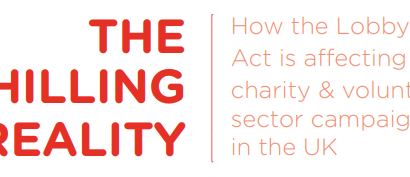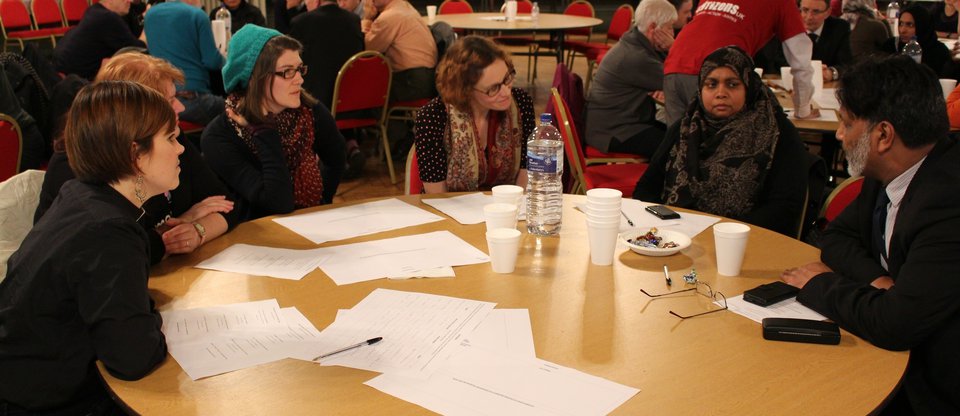We call for repeal of the Lobbying Act
Citizens UK founder and Executive Director, Neil Jameson, responds to " The Chilling Reality: how the Lobbying Act is affecting charity & voluntary sector campaigning " report published today by the Sheila McKechnie Foundation.

Citizens UK’s mission is to build the capacity of people to participate in public life and to minimise the barriers to public participation. For this reason we are calling for the repeal of the Lobbying Act and, at the very least, for charities to be exempt from its provisions.
There are many reasons to object to the Lobbying Act, a real block to civic action. Some of the more egregious reasons are the requirement to register with the Electoral Commission if spending a fairly modest sum, the length of the regulated period being a year, the unfairness of the regulated period being retrospective, the pernicious restrictions and difficulties on joint working that prevents small, local grassroots working together due to the regulatory requirements as well as fear of fines and the enforcement policy of the Electoral Commission.
Citizens UK is already regulated by charity law, understands full well that it can’t be party political and is non-partisan. It also understands and complies with the Representation of the People Act on hustings and election assemblies and is well versed in running them.
However, the Lobbying Act has introduced a chilling magnitude of regulation. For example, at the 2017 General Election Citizens UK was unable to work with other small refugee groups due to the rules on joint working, meaning everyone’s expenditure is potentially aggregated together. For example, a small group of voluntary citizens who actually spend £150, could be attributed with spending of £20,000, depending on the aggregated amount of all the other participants in the coalition.
But it is not just the spending, volunteer citizens will be tied up in a kafkaesque miasma of bureaucracy and paperwork that even legal experts struggle to interpret with any degree of certainty. It is a shocking failure of democracy that small coalitions of grass roots organisations are unable to work together; just when public life is crying out for participation.

Small groups of Citizens UK members come together to plan a campaign on housing.
Big data on Facebook and social media is manipulated in algorithms to target voters in totally untransparent ways and the Russians are sending bots and trolls to interfere in our elections. However, small groups of volunteer citizens in the UK are prevented from raising issues that are important to them and working collectively together. This is nothing but sinister.
Then there is the period for which the Lobbying Act applies. The fact that these rules potentially apply retrospectively for a year is a fundamental breach of human rights as well as being unfair and creating massive uncertainty. However, no further action has been taken by Government to rectify this, despite the Conservative peer Lord Hodgson recommending major reform.
Finally, there is the enforcement policy of the Electoral Commission. Despite acknowledging that the law is confusing and complex, the Electoral Commission, makes little concessions in its investigation work. Unlike other regulators, it does not have a core team that works on compliance as a midway point between policy and investigations. For example, if it is a first offence or obviously an honest mistake, the Electoral Commission could work with defaulters, to issue action plans and encourage compliance, scaling up its response if the offence is repeated.
However, despite the Electoral Commission’s policy team stating in talks to campaigners that there is nothing to fear, a first offence by non–party-campaigners will lead to a protracted and often lengthy investigation. The outcome is invariably a fine. The infringement could be as minor as a not putting an imprint on material, even if the organisation or individual is clearly identifiable on social media or mislaying a £250 receipt, even if the spending was legitimate and can be fully accounted for.
The Electoral Commission could make a distinction in its investigation and enforcement policies between political parties whose day to day business is elections (and can’t claim it was a first offence) from charities who do not have a long history of interacting with the Electoral Commission and are prohibited from being party political. Unlike political parties, charities do not employ a permanent election compliance team and would be criticised for doing so as a waste of resources. Inevitably for many charities, staff who worked on one election may have moved on at the next.
All the major political parties are regularly fined by the Electoral Commission. Political parties will deny this, but in truth they often view a fine (vastly lower than those imposed by the ICO) as the price of doing business, with no further consequences. Yet a relatively modest fine levied on a charity could have very serious consequences. It will be a reportable serious incident, the Charity Commission may then investigate and question the governance of the charity, the media will criticise the charity and not understand that the infraction may have been relatively minor and the Trustees can be accused of misconduct and mismanagement. No wonder that given all this, many charities shy away from registering with the Electoral Commission.
Because of the complexity and the interaction of charity law, the Lobbying Act and other election legislation, there is confusion in the sector and some misunderstanding. We are repeatedly told by Government that all that is required is more guidance. However, the answer is not more guidance because guidance can’t change the fundamentally chilling, confusing and byzantine nature of the law. Guidance cannot, for example, cure breaches of human rights such as the year long retrospective regulated period.
The answer is radical reform, including repeal of the Act. At the very least there should be an exemption for charities. If this were to be the case, charities will still be caught by charity law that prohibits charities from being party political and can be held to account by the tough regulation of the Charity Commission.
It is Citizens UK’s charitable mission that barriers to participation are minimised. We will continue to oppose this unprecedented restriction on ordinary citizens’ rights as part of our charitable mission to fight injustice and reduce the barriers to participation.
Neil Jameson
Executive Director
Citizens UK
04 June 2018
You can read the Sheila McKechnie Foundation report here .




